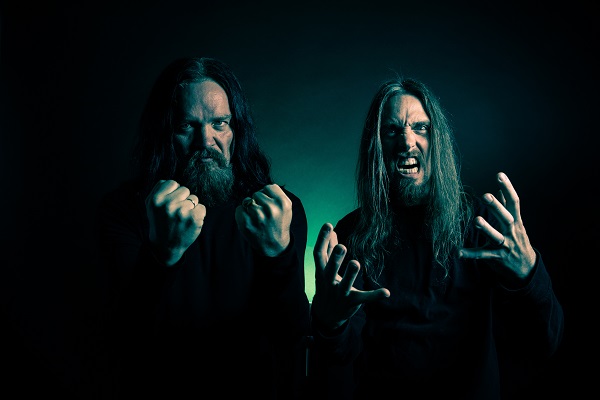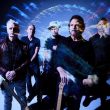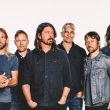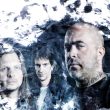Anders Odden of Cadaver, Interview – ‘Metal Brings the World Together’

Cadaver – Story by Anne Erickson, photo by Hannah Verbeuren
Anders Odden of Cadaver discusses the band’s first album in 16 years, “Edder & Bile,” and the power music has to bring people across the world together
Legendary Norwegian extreme metal band Cadaver is back after 16 years away with a new alum, “Edder & Bile,” out Black Friday (Nov. 27) via Nuclear Blast Records. Even though 16 years is a long time between albums, co-founder and guitarist Anders Odden has kept incredibly active, playing guitar in bands such as Celtic Frost and continuing to tour and make music.
Odden spoke with Anne Erickson of Audio Ink Radio about his journey as an extreme metal musician, why he’s so thrilled with the heavy songs on “Edder & Bile” and how he has experienced, first-hand, how music can bring people from different areas of the world together. Read the full interview below.
Anne Erickson: Congratulations on the new album, “Edder & Bile.” This is your first new, full-length album in 16 years. Tell me about that gap between records.
Anders Odden: It’s been a long time, but I’ve always still been a part of Cadaver. It feels like 30 years, though! (Laughs) So, making music in this way, we’ve actually had five albums in 30 years, so it’s not that bad. It’s still a little bit few and far between, but it’s not so little music, right? The story behind the wait is kind of backwards, because I was involved with other musical projects and have been playing guitar for very different bands, like Celtic Frost. So, I’ve been busy as a musician, but Cadaver has always been my own baby.
I really enjoy the track “Reborn” on the set. Tell me about the inspiration behind that song.
That song I wrote 20 years ago, around 1999 or 2000. I was recording guitar on some songs for Satyricon’s “Rebel Extravaganza” album, and during that time, I was rehearsing with Satyricon, and when I went to their rehearsal place, it was often just me and Frost warming up before Satyricon came down. At the time, Frost was playing blast beats as his warmup routine. He would just play blast beats half an hour! I was just jamming and warming up to his blast beats, and suddenly, I wrote all these riffs and realized this should be something. I can build a song for them. The lyrics are about getting yourself back into shape and rising from the ashes of failure or whatever you’ve done. I think failure is one of the best things we can do in life. As human beings, you should fail immensely to return with a totally new perspective and to learn something new, and you’ll do something much better the next time. So, I think failing is underrated. You should fail much more to become really successful or do something really good. You have to fail. If you don’t dare to fail, you don’t dare to be great.
You recorded this album in Los Angeles last year. How did the coronavirus situation impact the release of the new album?
The final mixes were done in July of 2019, and it was meant to be out earlier this year, and we were meant to be on tours, but as we know, the world didn’t go that way. It was actually one year ago now that I was diagnosed with cancer. It’s been a journey, but I returned cancer-free, and I can present this album now, which is fantastic. I feel like I’m truly reborn. This album and everything, it meant the world to me before, but now, it literally is my life. It’s basically the most personal thing I have ever done.
It’s so great to hear you’re cancer-free. It must feel extra special to release this album now, knowing you’re healthy.
Oh, yes, totally. It’s a very different thing. It feels like everything is just aligned in the right sort of way somehow for this. Sometimes, you can be lucky. It feels like the right moment to release this music, and the people are getting really excited about it. That just feels amazing, and to know people are liking it. I think that’s the same for anyone that tries to create something. You always really want it to be great, but this time, I really think this is a special album. People tell me that they’re connecting with it, and that means the world to me. I never can take this for granted, that my feelings get across to other people’s minds and feelings. It’s one of those things about being a human being and trying to do something good.
What is the overall theme on the new record?
One big theme is about life and death. What I say to people is that I tend to write about the human condition. We’re all able to be good people, but we’re also very able to be bad people. You always want to be your better self, but we know that we fail and do all these things that are not necessarily evil, but because we’re just humans and we fail, we’re causing misery. I’m trying to tap into all these emotions and trying to pinpoint certain things, which has been important in my own life and many other people’s lives, too.
You have this very extreme metal sound, and you’re known for playing in other bands with that aggressive vibe. What drew you to this very aggressive music?
Well, that has to do with the course of my youth. When I was 10, my grandfather got really sick, and my family moved from the suburbs to a farm. So, I used to have friends, and I could just walk over to other friends’ houses, and we were this neighborhood with lots of different families. Then, suddenly, I was isolated on a small farm, and I learned to play guitar. I was basically sitting there, trying to figure out my own life in this context, and then, suddenly, extreme metal exploded in 1985. It just clicked with me. I just started to dig into that and learn how to play that kind of music. I also got to know the guys in Mayhem really well early on, and they were my mentors in Norway. So, the combination of being isolated, rehearsing a lot and getting to know Mayhem at the right time basically shaped me into where I am right now.
What are your thoughts on when live music might get back to normal?
Oh, that’s a good question. We just announced that we will actually play a show in Oslo on Dec. 10. It’s in this venue that in normal circumstances would have a capacity of 1,200 people, and because of COVID-19, it’s only allowed with 200 people sitting on chairs with seats meters apart. We’ll do that and have a good lights show and stage performance. But, funnily enough, when we started out playing, like in 1989, when we played the first shows, I remember people sitting around tables at some of the shows. I think to get back to what we’re used to, it would probably take a couple of years to get back to normal. This is worldwide. It would take everybody accepting instructions from the health care system and the whole world under control and travel issues lifted. It’s a huge combination of things that has to be in the right alignment to make this happen. I think that things will eventually return to how they were, but we will be different humans after this. I’m pretty sure we will have a long period of getting back, because we will simply not trust. We’ll all have a trust issue for a while.
I’ve always heard that the Scandinavian metal scene is so rich compared to what we have in the U.S. How would you describe the Scandinavian music scene and how it impacted the kind of music you make?
Well, when we started out in the 1980s, if I wanted to see bands live, I had to go to their rehearsal space. There were no clubs allowing extreme bands to play. The whole thing with gigs started happening in the beginning of the ’90s, but there were no extreme metal shows from the underground scene until 1991. I’ve been to America a few times on tours, and I know there are a lot of fans out there for extreme music. It’s hard to know the difference, because America is not one place. It’s like Europe. Poland and the U.K. and Finland are very different. That’s kind of what I feel when I’m traveling around America. When you play in Texas, it’s a much different audience that when you play New York City or Seattle. It’s really kind of hard to say from my perspective, because I’ve been playing literally all around the world.
But, everywhere, people love metal music. If you’re in Europe, we can go to Israel– it’s really close to where we are. The Middle East is next door. You can literally walk from the Middle East to Europe. I’ve played in Israel and that’s when you realize how important music is for peace in the world. You can go to Israel and play a metal show, and everyone is there, from Jews to Palestinians to foreigners. It’s everybody together, listening to metal, which is beautiful. Metal brings the world together.
- The Most Underrated Pearl Jam Album of All Time - July 4, 2025
- 3 Underrated Foo Fighters Songs That Should Have Been Hits - June 23, 2025
- The Most Iconic U2 Album of All Time - June 18, 2025









